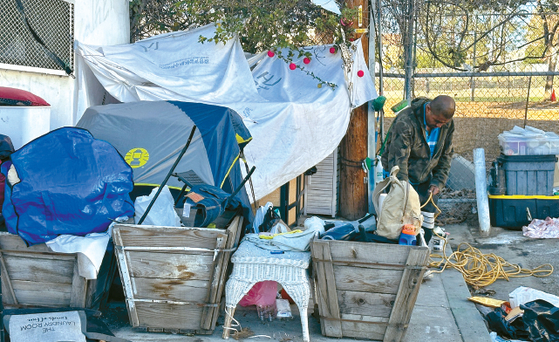
A group of 170 residents and tradespeople from different sections of Koreatown in Los Angeles have petitioned the neighborhood council to address the issue of homelessness.
Representatives from each neighborhood met with Wilshire Center-Koreatown Neighborhood Council (WCKNC) President Mark Lee on November 17 to present the petitions regarding the homeless encampments near Seoul International Park and Robert F. Kennedy (RFK) Inspiration Park.
Korean-American tradespeople in the neighborhood complained about homeless encampments on the south side of Seoul International Park, at the intersection of Olympic Boulevard and Irolo Street, causing serious safety and sanitation issues. The area is bordered on two sides by Chungkiwa Plaza and the former Kim Banga building, and on the north by the park’s wire fence, making it a secluded spot where many crimes are committed because it is not easily visible, according to the tradespeople.
“About five homeless people have been using the electricity and water in the plaza since a year ago,” said Kim Jung-woo (54), who has been running ‘LA Pack N Ship,’ a courier company in the plaza, for eight years. “They use prostitution and drugs in their cars, and even sexually assaulted a female homeless person recently. They also intimidate passersby with weapons, such as carrying large knives on their backs. I’m very worried about my children walking by,” he said.
The petition gathered 60 signatures from nearby retail dealers, landlords, tenants, customers, and students, who demanded the following: regular police patrols, regular cleanup, setting up meters, and resurfacing the damaged sidewalk.
At another location, Robert F. Kennedy (RFK) Inspiration Park, which borders RFK Community School, about 10 homeless people are staying there and committing various crimes, according to neighbors. 110 residents and shopowners of the Crosby Apartments next to the park, the Gaylord Apartments across the street, and Brown Derby Plaza also submitted a petition to the neighborhood council on November 17, asking that the issues of homeless encampments be addressed.
“The park has long become a homeless encampment village,” they wrote, “with recent shootings, violence, arson, graffiti, urination and defecation on buildings, and animal abuse.” “Although the park is on a school campus, it is under the jurisdiction of the LA City Department of Recreation and Parks,” they said, “and we are asking for a permanent solution, such as closing the park and installing a gate.”
Michael Westbrook, a nine-year resident of Gaylord Apartments, said, “At one point, a homeless man came into my apartment, yelled profanities at me, threatened to hit me, and did other bizarre things like taking his clothes off in front of the front desk staff.” “When the RFK Foundation built the park, they clearly stated that it was for ‘community members,’ but in reality, it became a space for homeless people. I don’t understand for whom this park is.”
“We’ve complained to the police, the parks department, and the school, but to no avail, and we’ve been ignored time and time again,” he said, adding, “We can’t take it anymore. It is the goal of the residents to close the park.”
WCKNC President Mark Lee, who received the petition, said, “We will conduct an on-site investigation to verify the facts. After the Thanksgiving holiday, we will submit the petition to the 10th District LA Councilmember’s office, the LAPD, LA Unified School District (LAUSD), and the LA City Bureau of Sanitation to seek redress,” he said.
“Recently, Seoul International Park has also recognized the problem of homelessness and requested cooperation from the neighborhood council,” said Lee. “Even when residents report to the police, they are unable to crack down properly due to the city’s strict regulations regarding homelessness.”
“On average, we receive nearly 10 homeless complaints per month,” he said. “However, most cases are not resolved because they cannot submit a petition or prove objective evidence such as photos. To convince public authorities, we need evidence to prove the facts.”
BY SUAH JANG [jang.suah@koreadaily.com]




